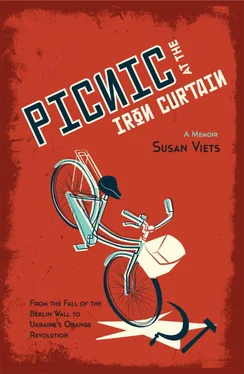“There are really great differences between the situation in DDR and Hungaria,” Helga said. “We heard a lot about the changings in Hungaria and I want to see this for myself.”
I told Helga that I did not know much about her country but had heard the East German government was repressive.
“I can understand why you’re curious about political developments here,” I said. “That’s what drew me to Budapest.”
I told her about key events that had occurred since my arrival nine months ago — demonstrations that began as opposition against a huge planned Gabčíkovo-Nagymaros dam project along the Danube River fuelled more political protest. Support for opposition parties that demanded a market economy and democratic elections grew quickly. Reformers in the Communist Party backed such change and seemed better aligned with opposition groups than with hard-liners in their own party.
“We hear that the old guard is being shaken off and everyone began to speak about all kinds of problems. This does not happen in DDR — why so late for us?” Helga said.
Over dinner Helga, Sabine and I chatted. Ute remained quiet. She spoke very little English. At times she stared intently as she tried to follow the conversation, but for most of the meal, she ate slowly, absorbed, I thought, in her own world. She had big eyes and long hair that draped down over the back of the chair. If Sabine was the boss and Helga the thinker, Ute was the dreamer.
I told my East German guests that in London people called Hungary “the happiest barracks in the camp.”
“This is good,” said Helga, “and maybe DDR is the unhappiest barracks.” Everyone laughed, even Ute, after Helga translated for her.
We discussed Hungary’s aggressive reform experiment and wondered whether an order from the Communist Party or interference from Moscow would abruptly reverse the changes. They did not offer an opinion. Both Sabine and Helga seemed interested in Hungary’s progressive Communism.
“I would like to get to know how you think, because you follow events from another perspective,” Helga said.
I described my initial impressions of Hungary, surprised that life here differed so much for the better from my expectations. My mother had visited Leningrad a few years earlier — an elegant city she said, filled with dour citizens dressed in drab clothes. The Soviet Bloc loomed in my mind as one large monolith and I therefore assumed that Communist Budapest would be similarly bleak and foreboding. It did not take long for these preconceptions to change.
Helga interrupted. “Yes, but you knew people from Hungaria and how it must be?”
“No, I didn’t know anyone here.”
“Just like us,” Sabine quipped.
“But I felt at home almost right away,” I said, “though, I had no idea how much Hungarians despise the Soviets.”
“We do not hate Russians in the DDR,” Sabine said. “They’re ahead of us. I try to teach some of what I learned in Moscow in my classes but I am not allowed. It is too progressive for us.”
“Hungaria is different, the happiest barracks,” said Helga. “In countries like Poland you have always to wait in long lines for something.” She glanced at Sabine.
I said that the Hungarian Communists surprised me. I never expected reformers in the party to lobby so aggressively for change, though the political opposition generated the freshest, boldest ideas. Many of the opposition members spoke English, so I could talk to them without an interpreter. Law students, about my age, vibrant and intellectually sophisticated, founded a liberal, reform-oriented political party, Fidesz. I went to their meetings, barbecues, parties and wished that all this existed at home. I never thought that I would be jealous of students in a Communist country. I told the East Germans that I wanted a life like this too.
“I had a crush on one of the opposition members, but not anymore,” I confessed. “Shotsy, the man with the megaphone. He leads the Fidesz marches.” They giggled.
“Handsome?” Sabine asked.
“Lean, energetic, this fiercely determined sense of purpose,” I replied. “We had drinks together after a massive demonstration that ended at the central television station. I asked Shotsy how he felt as he stood at the top of the steps, with tens of thousands of protesters at his feet.”
“I knew if I told them to charge the building, they would,” he said.
“Those opposition leaders have so much power but they’re restrained,” I told Sabine and Helga. “I guess that’s why the change is so orderly.”
Two events stood out for Ute, Helga and Sabine: the first, the April 1989 initial withdrawal of Soviet tanks from Hungary. Two months later the government cut through an Iron Curtain section in Hungary, which left a big hole in a barbed wire fence that separated Hungary from Austria, and the Soviet Bloc from Western Europe.
“Liberation,” I started to say. Sabine interrupted, her interpretation, different:
“When the tanks went and the cut in the Iron Curtain happened people in DDR thought our leaders would lock the border,” Sabine said. “We wanted to come to Hungaria before the locking.”
I imagined gigantic impregnable gates slamming shut all around the border of East Germany. I could go anywhere in the world that I wanted. Travel options for Ute, Helga and Sabine, already limited, were about to become worse. They would soon be prisoners in their own country.
“The problem how to pay the holidays is not easily solved,” said Sabine. “Our leaders only let us change a little bit of money for the currency of Hungaria. When this is spent we must go home.”
Sabine told me that she had planned a holiday in Budapest while it was still possible. Her younger neighbour in Dresden, Ute, asked if she could come. Ute’s university friend, Helga, joined Sabine and Ute. They carried food from East Germany and asked to stay so they could save money and prolong the trip. I felt embarrassed that we had used their supplies for dinner. I would have to stock the fridge.
The four of us managed well in a small apartment. Sabine and I shared the bedroom. Ute and Helga slept in the living room. By remaining tidy, we could still manoeuvre even though their backpacks occupied half the space.
Sabine had a list of must-see sites. During the day, if I did not work, I led my East German guests on these trips. We wandered through cobblestone streets in the castle district and rode the funicular, with its panoramic view of the city, back down to the river bank. We had tea at Gerbeaud’s in Vörösmarty tér. Inside, time stood still. This spacious coffee house with high ceilings and no trace of Soviet influence attracted many in the city. We lounged on wicker chairs with green cushions. People nearby read newspapers or talked in small groups. Most seemed settled in for the day. Chandeliers hung overhead. We lingered and sampled pastries.
One rainy evening, we had drinks at a local bar, the Fregatt. With its wood panelling and low lights, it was as cozy as the dry, warm lower deck of a ship. I bumped into English and Hungarian friends. The band played. We listened a while, then talked politics and gossiped about friends’ relationships. When I next looked round, I saw Ute in the distance surrounded by young guys in jeans and blazers, that prosperous, stylishly bespectacled look of Bohemian West Germans. Ute, different now, animated in her own language, laughed a lot. Later that night as we lay asleep in our beds, male voices woke us. The West Germans stood on the street by the apartment and shouted for Ute.
Seven days passed quickly. Sabine packed her knapsack for the trip home to Dresden. Ute and Helga asked if they could stay a few days longer.
“No problem,” I replied. I enjoyed their company.
Читать дальше












